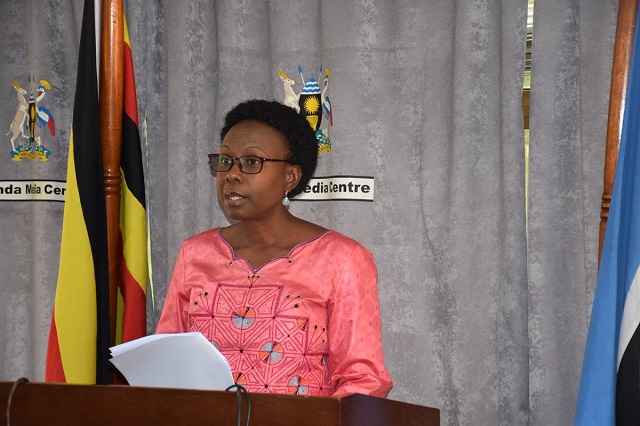
Kampala, Uganda | THE INDEPENDENT | The Health Ministry has extended Uganda’s Ebola response plan due to lack of funding.
The Ebola response plan was supposed to end in September 2019, but has now been extended to the end of December 2019 due to lack of funds as the Ministry waits for development partners to fulfill their pledges.
The Health Minister, Dr. Jane Ruth Aceng disclosed their decision to extend the Ebola response plan.
According to the Health Ministry, only 30 percent of the proposed Shillings 64 billion required for the plan has been received from development partners. Some of the development partners that have so far contributed include the US government, the United Nations Human Rights Commission-UNHRC, United Nations Children’s Emergency Fund-UNICEF, WHO, Japanese International Cooperation Agency-JICA and the Department for International Development-DFID.
The extension of the Ebola response plan comes at a time when the Ebola outbreak in the DRC has been declared a public health emergency of international concern after several Ebola cases were reported in Goma, DRC. Uganda is at risk of expose to the disease, given the fact it shares more than one border crossing with DRC. At least three Ebola cases spilled to Uganda from the DRC. Uganda’s Ebola preparedness budget released in July 2019 stood at Shillings 64 billion, a bigger percentage of which was allocated to case management and infection control. Other components of the plan include building community resilience and institutional capacity to respond to an outbreak, to prevent the importation of Ebola into Uganda, and to prepare for a possible outbreak.
At the moment, an additional Shillings 44 billion is needed to realize the response plan. According to the WHO and the Health Ministry, the most catered for district at the moment in terms of prepared is Kasese where three cases were confirmed in June, 2019. Other parts of the country are not in good shape as far as preparedness is concerned.
Dr. Yonas Woldermariam, the WHO Representative, says the country’s response plan is slow due to lack of funding, saying some parts of the country are not prepared. “The plan is not going on as it should be because we do not have enough money. Only the Rwenzururu region is doing well. Other areas are lagging behind.”
A total of 23 districts that share borders with DRC are catered for in the plan. Health officials that URN spoke to from some of the districts intimated that they lacked equipment vital for Ebola prevention and control. According to health officials the level of preparedness is still low. Most districts don’t have personnel protective equipment or chlorine solutions.
Dr. Paul Onzubo, the Maracha District Health Officer says while people have been trained how to handle Ebola, health workers have no idea on how to use protective gear. In case of an outbreak, he says health workers in Maracha would be stuck.
“There’s knowledge. Health workers are trained in the general principals of infection prevention and control but most of them do not know how to use some of the gear used. We were given five gears but we do not know how to use them. So we have them but are keeping it.”
Maracha is 38 kilometers away from Arua district. According to Dr. Onzuba, if an Ebola patient was received at a health facility in the district, a health worker from Arua Regional hospital would have to travel to the health facility to offer treatment.
Dr. Agatha Kebirungi, an Infection Control and Prevention Focal Person at Nyakibaale hospital in Rukungiri, says that they only have 30 percent of the required equipment in terms of Ebola treatment.
Dr. Seth Tibenda, the Rubirizi District Health Officer, says the district doesn’t even have an Ebola Treatment Unit-ETU. He says health workers are always at risk or acquiring the disease.
The health ministry received 3 ambulances,31 motorcycles and a walk-in scanner on Thursday that will be placed at Entebbe International Airport.
The donations worth Shillings 700 million were from DFID and UNICEF.
They were given to help Ebola response in refugee hosting districts like Yumbe, Arua, Adjumani, Moyo, Lamwo. Kikuube, Kiryadongo, Kamwenge, Kyegegwa, Hoima, Ntororoko, Isingiro, Koboko and Kanungu.
*****
URN
 The Independent Uganda: You get the Truth we Pay the Price
The Independent Uganda: You get the Truth we Pay the Price


